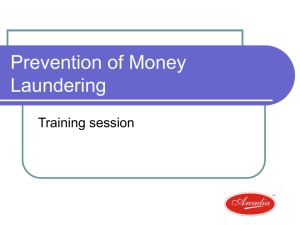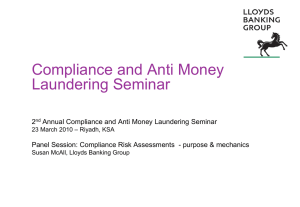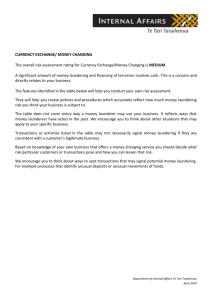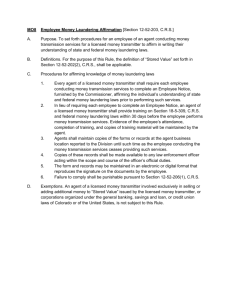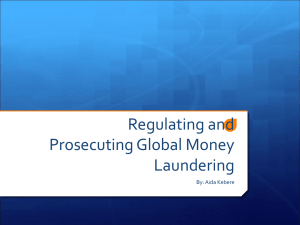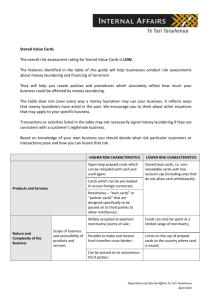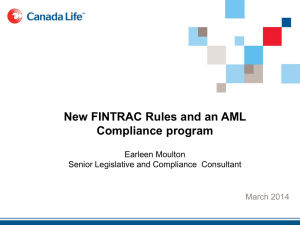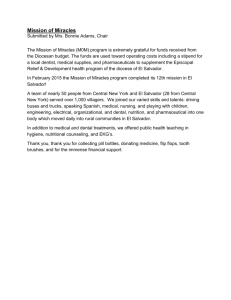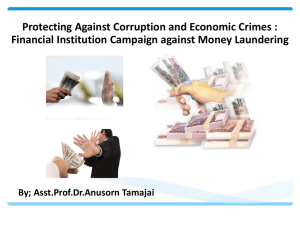Committee: Committee for Crime Prevention and Justice
advertisement
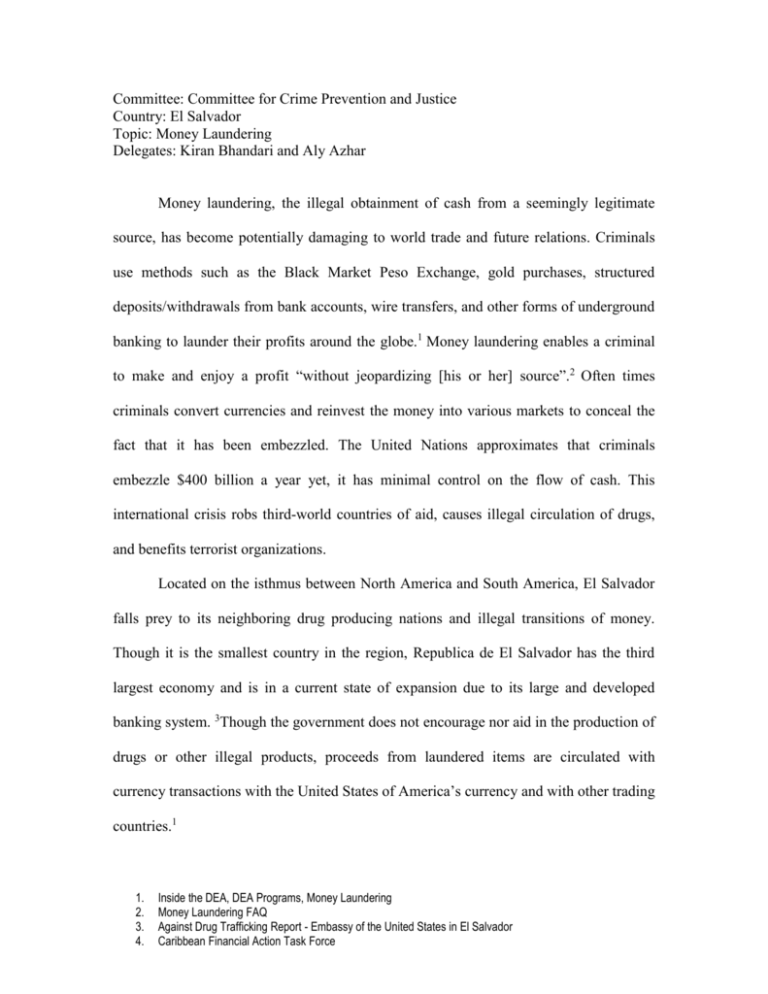
Committee: Committee for Crime Prevention and Justice Country: El Salvador Topic: Money Laundering Delegates: Kiran Bhandari and Aly Azhar Money laundering, the illegal obtainment of cash from a seemingly legitimate source, has become potentially damaging to world trade and future relations. Criminals use methods such as the Black Market Peso Exchange, gold purchases, structured deposits/withdrawals from bank accounts, wire transfers, and other forms of underground banking to launder their profits around the globe.1 Money laundering enables a criminal to make and enjoy a profit “without jeopardizing [his or her] source”.2 Often times criminals convert currencies and reinvest the money into various markets to conceal the fact that it has been embezzled. The United Nations approximates that criminals embezzle $400 billion a year yet, it has minimal control on the flow of cash. This international crisis robs third-world countries of aid, causes illegal circulation of drugs, and benefits terrorist organizations. Located on the isthmus between North America and South America, El Salvador falls prey to its neighboring drug producing nations and illegal transitions of money. Though it is the smallest country in the region, Republica de El Salvador has the third largest economy and is in a current state of expansion due to its large and developed banking system. 3Though the government does not encourage nor aid in the production of drugs or other illegal products, proceeds from laundered items are circulated with currency transactions with the United States of America’s currency and with other trading countries.1 1. 2. 3. 4. Inside the DEA, DEA Programs, Money Laundering Money Laundering FAQ Against Drug Trafficking Report - Embassy of the United States in El Salvador Caribbean Financial Action Task Force El Salvador is a supporter of programs that aid in diminishing crimes in soliciting and receiving/offering bribes. Since 1971, we have served on the UN Convention on Psychotropic Substances, the UN Convention against Transnational Organized Crime, and the United Nations Office on Drugs and Crime (UNODC). In 2006, UNODC established training classrooms to enforce UN Protocols which provide recommendations for new or stronger regulation, assist in preventing criminal activities, and improve international relations. Illicit actions such as drug trading and money laundering prohibit a country from developing and operating at maximum efficiency. El Salvador feels that the manufacturing of illicit products has become an incessant issue in South and Latin America. Money laundering is a crime that is punishable by law. The detriment to this situation arises due to the difficulty of tracking criminals throughout the world. In 1989, the Financial Action Task Force (FATF) was created to research and discover the root of this corruption and to implement regulation to stop money laundering. El Salvador is a part of the Caribbean Financial Task Force and we strive to achieve effective implementation to prevent and control money laundering as well as to combat the financing of terrorism.4 El Salvador understands that no one country has the power to stop this situation and is willing to work with the United Nations to reduce the amount of poverty, crime, and suffering around the globe. Our country has established laws which require all incoming citizens to provide legal declaration of any monetary instruments within a 30day period. Some solutions to this problem could be to initiate international policies which will not only penalize money laundering but attack the root of the cause. The 1. 2. 3. 4. Inside the DEA, DEA Programs, Money Laundering Money Laundering FAQ Against Drug Trafficking Report - Embassy of the United States in El Salvador Caribbean Financial Action Task Force money that is laundered is considered as “dirty” due to the illegal economic transactions of drugs, such as heroin and marijuana, which are smuggled around the globe. El Salvador believes that the government has to assert laws to stop methods such as the Black Market Peso Exchange which consists of smuggling goods into the United States from Columbia and receiving full commission without paying tariffs, taxes, or any fees to the legal system. El Salvador is vulnerable at this point in time because it is defined by this criminal activity. We would like to reduce the number of criminal organizations that operate within the country and suggest new laws which require documentation of all sources of expense sheets and invoices. We feel that it is necessary to educate the native citizens about this process and the negative results caused by money laundering. Within casinos, lotteries, or areas of gambling, handling large amounts of cash is a part of the job. Money launderers may make small bets or buy casino chips in relatively small amounts and then cash them in again in the form of checks to provide a “legitimate” source of income. El Salvador cannot suppress the issue of money laundering on its own; it needs aid from the dominant world powers in order to eradicate this international crime. 1. 2. 3. 4. Inside the DEA, DEA Programs, Money Laundering Money Laundering FAQ Against Drug Trafficking Report - Embassy of the United States in El Salvador Caribbean Financial Action Task Force Works Consulted "About the FATF." Financial Action Task Force (FATF). 30 Jan. 2008 <http://www.fatfgafi.org/pages/0,3417,en_32250379_32236836_1_1_1_1_1,00.html>. "Against Drug Trafficking Report - Embassy of the United States in El Salvador." Embassy of the United States. 30 Jan. 2008 <http://sansalvador.usembassy.gov/news/2005/reports/dt/es2.html>. "Caribbean Financial Action Task Force." CFATF. 12 July 2007. 30 Jan. 2008 <http://www.cfatf.org/>. Chapter Seventeen: Money Laundering What Do We Know? Inter-American Development Bank. 1-16. 30 Jan. 2008 <www.iadb.org/res/ipes/2005/docs/Chapter17Eng.pdf>. Deraymond, Joe. "A Nation Fleeing Itself." Lehigh Valley Independent Press. LEPOCO Newsletter. 30 Jan. 2008 <http://www.lvindependent.org/_mgxroot/page_10796.html>. Headquarters Activities. United Nations Office on Drugs and Crime. United Nations Office on Drugs and Crime, 2007. 1-15. 30 Jan. 2008 <http://www.unodc.org/pdf/annual_report_2007/HQactivities.pdf>. Layton, Julia. "Howstuffworks "How Money Laundering Works"" Howstuffworks. 30 Jan. 2008 <http://money.howstuffworks.com/money-laundering.htm>. "Major Money Laundering Countries." US Department of State. Mar. 2007. 30 Jan. 2008 <http://www.state.gov/p/inl/rls/nrcrpt/2007/vol2/html/80883.htm>. "Money Laundering." United Nations Department of Public Information. 30 Jan. 2008 <http://www.un.org/ga/20special/featur/launder.htm>. National Money Laundering Strategy. National Money Laundering Strategy. 2007. 1112. 30 Jan. 2008 <http://www.treas.gov/press/releases/docs/nmls.pdf>. 1. 2. 3. 4. Inside the DEA, DEA Programs, Money Laundering Money Laundering FAQ Against Drug Trafficking Report - Embassy of the United States in El Salvador Caribbean Financial Action Task Force
